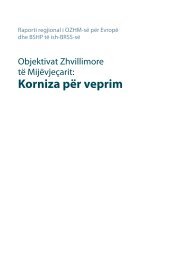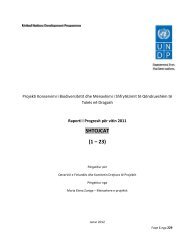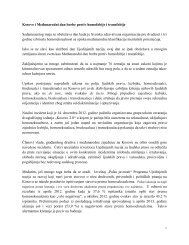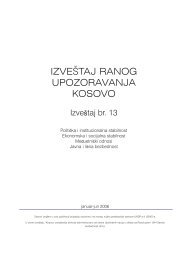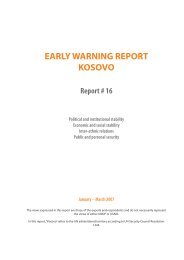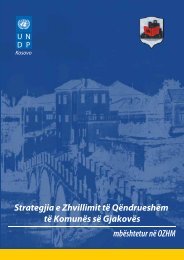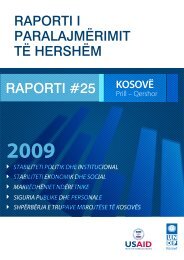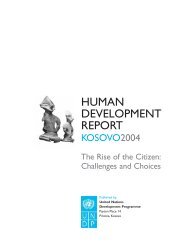Kosovo Human Development Report 2010 - UNDP Kosovo - United ...
Kosovo Human Development Report 2010 - UNDP Kosovo - United ...
Kosovo Human Development Report 2010 - UNDP Kosovo - United ...
Create successful ePaper yourself
Turn your PDF publications into a flip-book with our unique Google optimized e-Paper software.
able to unemployment than rural areas,<br />
relying heavily on business and job<br />
markets as primary sources of income,<br />
but this fact locks farmers into subsistence<br />
living as their only access to factor<br />
markets. Voter rates are falling fastest<br />
amongst the young – usually the<br />
most politically active of all age groups.<br />
However, the sheer scale of exclusion<br />
across Kosovan society is perhaps the<br />
report’s most marked and Important<br />
finding. Far from being a minority phenomenon,<br />
exclusion is a majority condition,<br />
experienced by a wide range of<br />
people across many dimensions of life.<br />
Exclusion – whether from economic<br />
life, social services or civic engagement<br />
– is a critical development challenge<br />
for <strong>Kosovo</strong> that considerably erodes<br />
the full contribution of its people as<br />
economically active, healthy and educated<br />
citizens.<br />
How could such a state of affairs have<br />
arisen, after so much early promise and<br />
development investment? Although<br />
the root causes of exclusion differ<br />
slightly by sector, the report identifies<br />
some common drivers that present<br />
urgent and immediate challenges. All<br />
ultimately lead to a lack of central and<br />
high-level leadership on social inclusion,<br />
allowing inconsistent and uncoordinated<br />
policies, denying central and<br />
local implementing authorities the<br />
guidance they badly need and offering<br />
no point of reference to civic and<br />
community organizations wishing to<br />
engage with institutional authorities.<br />
Other governance causes of exclusion<br />
naturally follow from this central point:<br />
a lack of accountability to implement<br />
the wealth of high-quality social laws<br />
already on the books, a weak evidence<br />
base for monitoring results, the emergence<br />
of regional inequities during the<br />
decentralization process and difficulties<br />
faced by ministries seeking to work<br />
12 | KOSOVO HUMAN DEVELOPMENT REPORT <strong>2010</strong><br />
together across sectors. <strong>Kosovo</strong> faces<br />
profound social challenges to the realization<br />
of social inclusion due to two<br />
mutually reinforcing drivers of social<br />
exclusion specific to the situation in<br />
<strong>Kosovo</strong>:<br />
1) the legacy of the recent conflict<br />
which produced tensions between<br />
and within societal groups, and;<br />
2) weak governance capacity that<br />
limits the implementation of policies<br />
to foster social inclusion.<br />
These drivers have created cultural attitudes<br />
which foster de facto discrimination<br />
against certain groups and reinforce<br />
self-exclusion among the most<br />
ostracized. Governance and social<br />
drivers of exclusion are manifested<br />
in a visible disconnect in the normal<br />
democratic feedback cycle, where authorities<br />
make little effort to seek input<br />
from the excluded and the public has<br />
retreated from political activism, weary<br />
of trying to make their voices heard.<br />
The report highlights two particular<br />
factors for policy change that also concern<br />
<strong>Kosovo</strong>’s international partners:<br />
lack of social cohesion and a failure of<br />
self-reliance. <strong>Kosovo</strong>’s EU aspirations<br />
demand a deep social cooperation, in<br />
which different ethnic and social identities<br />
view each other as allies rather<br />
than competitors in the race to achieve<br />
long-cherished goals. However, <strong>Kosovo</strong>’s<br />
effort to coalesce as a society<br />
has been complicated in part by large<br />
international investment affecting its<br />
delicate socio-economic balance. This<br />
investment, albeit well-intentioned<br />
and important for <strong>Kosovo</strong>’s future, has<br />
limited an essential process of “natural<br />
selection” that would normally allow<br />
the gradual emergence of internallysustained<br />
and locally-valued social<br />
policies, networks and organizations.<br />
As a result, <strong>Kosovo</strong> has a great number<br />
of social policies and development



